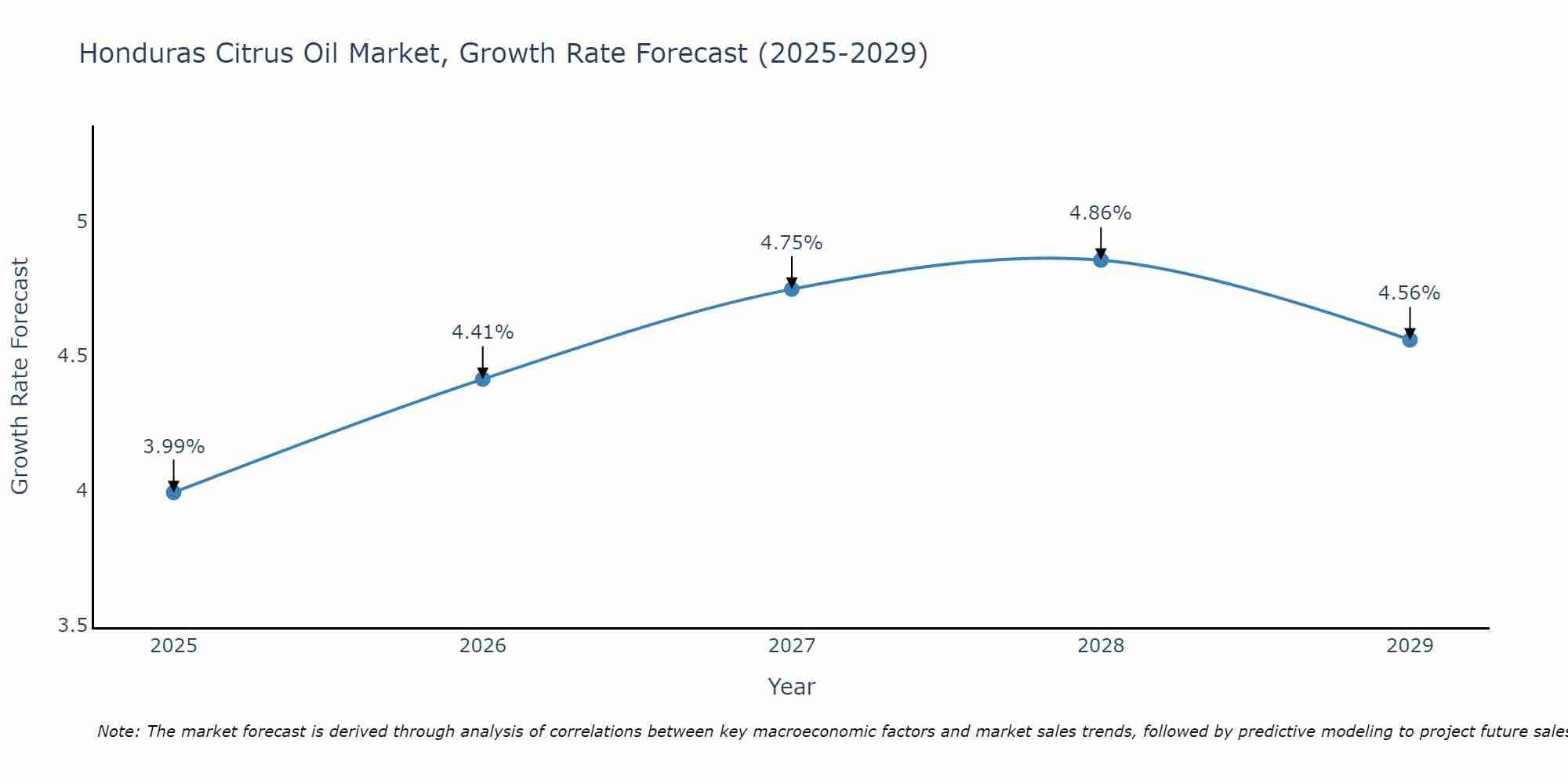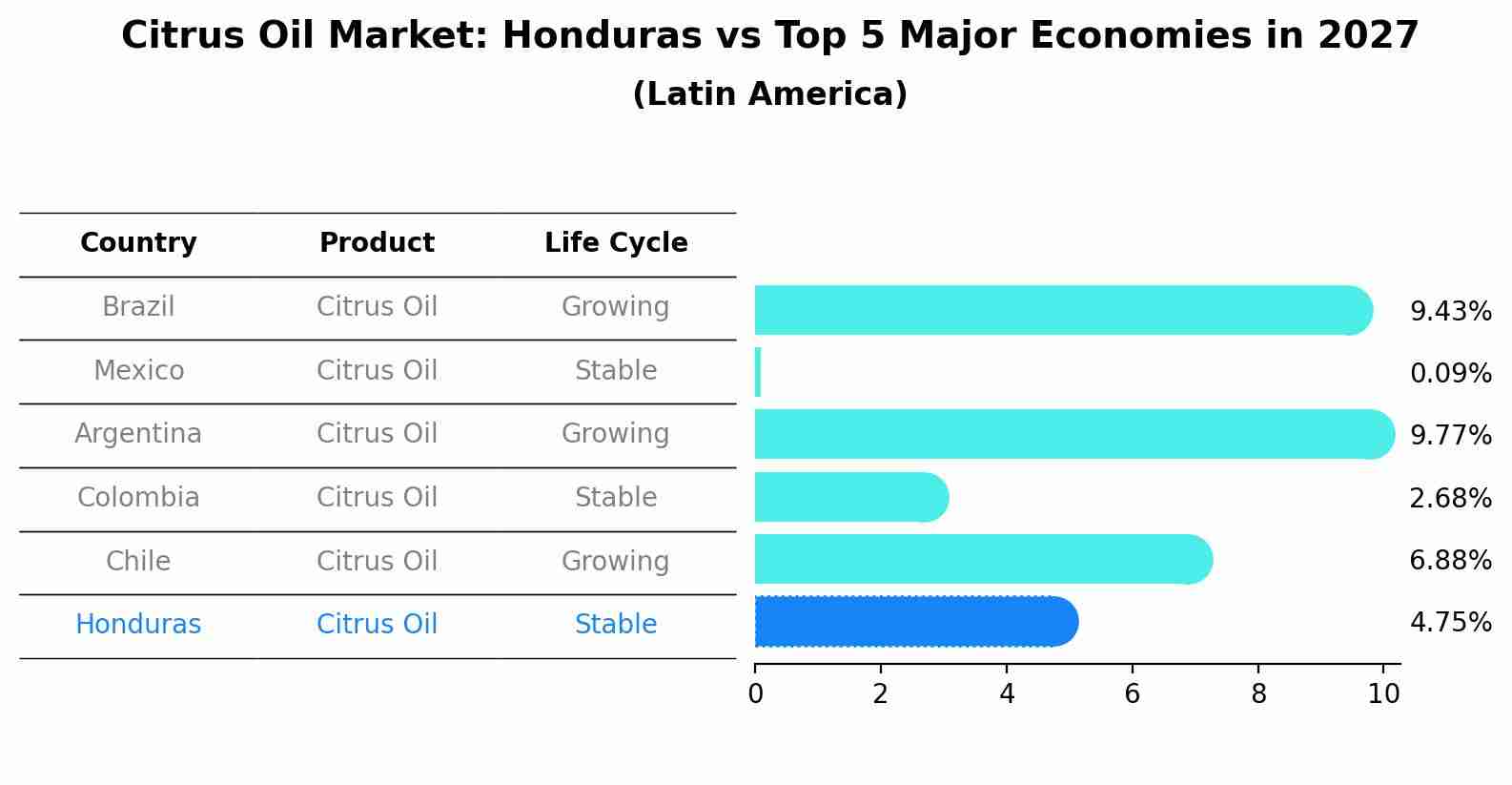Honduras Citrus Oil Market (2025-2031) | Analysis, Size, Growth, Value, Segmentation, Forecast, Share, Industry, Revenue, Outlook, Trends & Companies
| Product Code: ETC4689091 | Publication Date: Nov 2023 | Updated Date: Apr 2025 | Product Type: Market Research Report | |
| Publisher: 6Wresearch | Author: Shubham Padhi | No. of Pages: 60 | No. of Figures: 30 | No. of Tables: 5 |
Honduras Citrus Oil Market Size Growth Rate
The Honduras Citrus Oil Market is projected to witness mixed growth rate patterns during 2025 to 2029. Growth accelerates to 4.86% in 2028, following an initial rate of 3.99%, before easing to 4.56% at the end of the period.

Citrus Oil Market: Honduras vs Top 5 Major Economies in 2027 (Latin America)
The Citrus Oil market in Honduras is projected to grow at a stable growth rate of 4.75% by 2027, highlighting the country's increasing focus on advanced technologies within the Latin America region, where Brazil holds the dominant position, followed closely by Mexico, Argentina, Colombia and Chile, shaping overall regional demand.

Honduras Citrus Oil Market Synopsis
Honduras` citrus oil market is growing due to the global demand for essential oils in the fragrance, cosmetics, and food industries. Citrus oils, including lemon, orange, and lime oils, are prized for their refreshing scents and their potential health benefits, such as antioxidant properties. As consumer interest in natural ingredients increases, the market for citrus oils in Honduras is experiencing significant growth. The availability of locally sourced citrus fruits is a key advantage for the region, facilitating the production of high-quality citrus oils. This market is also benefiting from the rise of natural cleaning products and their incorporation of citrus-based ingredients.
Drivers of the market
The citrus oil market in Honduras is fueled by its extensive use in the food and beverage, cosmetic, and pharmaceutical industries. The rising demand for natural flavors and fragrances in consumer products drives market growth. Citrus oil is also gaining popularity in aromatherapy and wellness products due to its therapeutic properties. The country`s favorable climate for citrus fruit cultivation ensures a steady supply of raw materials, further supporting the market`s expansion.
Challenges of the market
The citrus oil market in Honduras faces challenges primarily due to limited domestic citrus cultivation, which necessitates importing significant quantities of citrus fruits for oil extraction. This reliance on imports exposes the market to price volatility and supply chain disruptions. Additionally, inconsistent agricultural practices, lack of advanced processing technologies, and limited investment in the local citrus sector prevent the market from reaching its full potential. The underdeveloped infrastructure and relatively small-scale production also hinder economies of scale, increasing production costs and making it difficult to compete with larger citrus oil producers in other countries.
Government Policy of the market
In line with the global demand for natural oils, the citrus oil market in Honduras is supported by governmental initiatives to boost agricultural production and essential oil processing capabilities. Policies might focus on increasing the production of citrus fruits, such as oranges and lemons, which are the primary sources for citrus oils. Government incentives could include financial support for farmers, research funding for improving extraction methods, and the promotion of sustainable agricultural practices. Additionally, policies would likely involve developing infrastructure, including cold storage and transportation systems, to ensure the quality and timely delivery of citrus products. Through these measures, the government hopes to increase both the quantity and quality of citrus oil produced in the country, benefiting local industries and increasing export opportunities.
Key Highlights of the Report:
- Honduras Citrus Oil Market Outlook
- Market Size of Honduras Citrus Oil Market, 2024
- Forecast of Honduras Citrus Oil Market, 2031
- Historical Data and Forecast of Honduras Citrus Oil Revenues & Volume for the Period 2021-2031
- Honduras Citrus Oil Market Trend Evolution
- Honduras Citrus Oil Market Drivers and Challenges
- Honduras Citrus Oil Price Trends
- Honduras Citrus Oil Porter`s Five Forces
- Honduras Citrus Oil Industry Life Cycle
- Historical Data and Forecast of Honduras Citrus Oil Market Revenues & Volume By Product Type for the Period 2021-2031
- Historical Data and Forecast of Honduras Citrus Oil Market Revenues & Volume By Orange Oil for the Period 2021-2031
- Historical Data and Forecast of Honduras Citrus Oil Market Revenues & Volume By Lemon Oil for the Period 2021-2031
- Historical Data and Forecast of Honduras Citrus Oil Market Revenues & Volume By Lime Oil for the Period 2021-2031
- Historical Data and Forecast of Honduras Citrus Oil Market Revenues & Volume By Grapefruit Oil for the Period 2021-2031
- Historical Data and Forecast of Honduras Citrus Oil Market Revenues & Volume By Others for the Period 2021-2031
- Historical Data and Forecast of Honduras Citrus Oil Market Revenues & Volume By Application for the Period 2021-2031
- Historical Data and Forecast of Honduras Citrus Oil Market Revenues & Volume By Personal Care for the Period 2021-2031
- Historical Data and Forecast of Honduras Citrus Oil Market Revenues & Volume By Food & Beverages for the Period 2021-2031
- Historical Data and Forecast of Honduras Citrus Oil Market Revenues & Volume By Pharmaceuticals for the Period 2021-2031
- Historical Data and Forecast of Honduras Citrus Oil Market Revenues & Volume By Aromatherapy for the Period 2021-2031
- Honduras Citrus Oil Import Export Trade Statistics
- Market Opportunity Assessment By Product Type
- Market Opportunity Assessment By Application
- Honduras Citrus Oil Top Companies Market Share
- Honduras Citrus Oil Competitive Benchmarking By Technical and Operational Parameters
- Honduras Citrus Oil Company Profiles
- Honduras Citrus Oil Key Strategic Recommendations
Frequently Asked Questions About the Market Study (FAQs):
1 Executive Summary |
2 Introduction |
2.1 Key Highlights of the Report |
2.2 Report Description |
2.3 Market Scope & Segmentation |
2.4 Research Methodology |
2.5 Assumptions |
3 Honduras Citrus Oil Market Overview |
3.1 Honduras Country Macro Economic Indicators |
3.2 Honduras Citrus Oil Market Revenues & Volume, 2021 & 2031F |
3.3 Honduras Citrus Oil Market - Industry Life Cycle |
3.4 Honduras Citrus Oil Market - Porter's Five Forces |
3.5 Honduras Citrus Oil Market Revenues & Volume Share, By Product Type, 2021 & 2031F |
3.6 Honduras Citrus Oil Market Revenues & Volume Share, By Application, 2021 & 2031F |
4 Honduras Citrus Oil Market Dynamics |
4.1 Impact Analysis |
4.2 Market Drivers |
4.3 Market Restraints |
5 Honduras Citrus Oil Market Trends |
6 Honduras Citrus Oil Market Segmentations |
6.1 Honduras Citrus Oil Market, By Product Type |
6.1.1 Overview and Analysis |
6.1.2 Honduras Citrus Oil Market Revenues & Volume, By Orange Oil, 2021-2031F |
6.1.3 Honduras Citrus Oil Market Revenues & Volume, By Lemon Oil, 2021-2031F |
6.1.4 Honduras Citrus Oil Market Revenues & Volume, By Lime Oil, 2021-2031F |
6.1.5 Honduras Citrus Oil Market Revenues & Volume, By Grapefruit Oil, 2021-2031F |
6.1.6 Honduras Citrus Oil Market Revenues & Volume, By Others, 2021-2031F |
6.2 Honduras Citrus Oil Market, By Application |
6.2.1 Overview and Analysis |
6.2.2 Honduras Citrus Oil Market Revenues & Volume, By Personal Care, 2021-2031F |
6.2.3 Honduras Citrus Oil Market Revenues & Volume, By Food & Beverages, 2021-2031F |
6.2.4 Honduras Citrus Oil Market Revenues & Volume, By Pharmaceuticals, 2021-2031F |
6.2.5 Honduras Citrus Oil Market Revenues & Volume, By Aromatherapy, 2021-2031F |
7 Honduras Citrus Oil Market Import-Export Trade Statistics |
7.1 Honduras Citrus Oil Market Export to Major Countries |
7.2 Honduras Citrus Oil Market Imports from Major Countries |
8 Honduras Citrus Oil Market Key Performance Indicators |
9 Honduras Citrus Oil Market - Opportunity Assessment |
9.1 Honduras Citrus Oil Market Opportunity Assessment, By Product Type, 2021 & 2031F |
9.2 Honduras Citrus Oil Market Opportunity Assessment, By Application, 2021 & 2031F |
10 Honduras Citrus Oil Market - Competitive Landscape |
10.1 Honduras Citrus Oil Market Revenue Share, By Companies, 2024 |
10.2 Honduras Citrus Oil Market Competitive Benchmarking, By Operating and Technical Parameters |
11 Company Profiles |
12 Recommendations | 13 Disclaimer |
- Single User License$ 1,995
- Department License$ 2,400
- Site License$ 3,120
- Global License$ 3,795
Search
Thought Leadership and Analyst Meet
Our Clients
Related Reports
- Afghanistan Apparel Market (2026-2032) | Growth, Outlook, Industry, Segmentation, Forecast, Size, Companies, Trends, Value, Share, Analysis & Revenue
- Canada Oil and Gas Market (2026-2032) | Share, Segmentation, Value, Industry, Trends, Forecast, Analysis, Size & Revenue, Growth, Competitive Landscape, Outlook, Companies
- Germany Breakfast Food Market (2026-2032) | Industry, Share, Growth, Size, Companies, Value, Analysis, Revenue, Trends, Forecast & Outlook
- Australia Briquette Market (2025-2031) | Growth, Size, Revenue, Forecast, Analysis, Trends, Value, Share, Industry & Companies
- Vietnam System Integrator Market (2025-2031) | Size, Companies, Analysis, Industry, Value, Forecast, Growth, Trends, Revenue & Share
- ASEAN and Thailand Brain Health Supplements Market (2025-2031) | Strategy, Consumer Insights, Analysis, Investment Trends, Opportunities, Growth, Size, Share, Industry, Revenue, Segments, Value, Segmentation, Supply, Forecast, Restraints, Outlook, Competition, Drivers, Trends, Demand, Pricing Analysis, Competitive, Strategic Insights, Companies, Challenges
- ASEAN Bearings Market (2025-2031) | Strategy, Consumer Insights, Analysis, Investment Trends, Opportunities, Growth, Size, Share, Industry, Revenue, Segments, Value, Segmentation, Supply, Forecast, Restraints, Outlook, Competition, Drivers, Trends, Demand, Pricing Analysis, Competitive, Strategic Insights, Companies, Challenges
- Europe Flooring Market (2025-2031) | Outlook, Share, Industry, Trends, Forecast, Companies, Revenue, Size, Analysis, Growth & Value
- Saudi Arabia Manlift Market (2025-2031) | Outlook, Size, Growth, Trends, Companies, Industry, Revenue, Value, Share, Forecast & Analysis
- Uganda Excavator, Crane, and Wheel Loaders Market (2025-2031) | Strategy, Consumer Insights, Analysis, Investment Trends, Opportunities, Growth, Size, Share, Industry, Revenue, Segments, Value, Segmentation, Supply, Forecast, Restraints, Outlook, Competition, Drivers, Trends, Demand, Pricing Analysis, Competitive, Strategic Insights, Companies, Challenges
Industry Events and Analyst Meet
Whitepaper
- Middle East & Africa Commercial Security Market Click here to view more.
- Middle East & Africa Fire Safety Systems & Equipment Market Click here to view more.
- GCC Drone Market Click here to view more.
- Middle East Lighting Fixture Market Click here to view more.
- GCC Physical & Perimeter Security Market Click here to view more.
6WResearch In News
- Doha a strategic location for EV manufacturing hub: IPA Qatar
- Demand for luxury TVs surging in the GCC, says Samsung
- Empowering Growth: The Thriving Journey of Bangladesh’s Cable Industry
- Demand for luxury TVs surging in the GCC, says Samsung
- Video call with a traditional healer? Once unthinkable, it’s now common in South Africa
- Intelligent Buildings To Smooth GCC’s Path To Net Zero


















